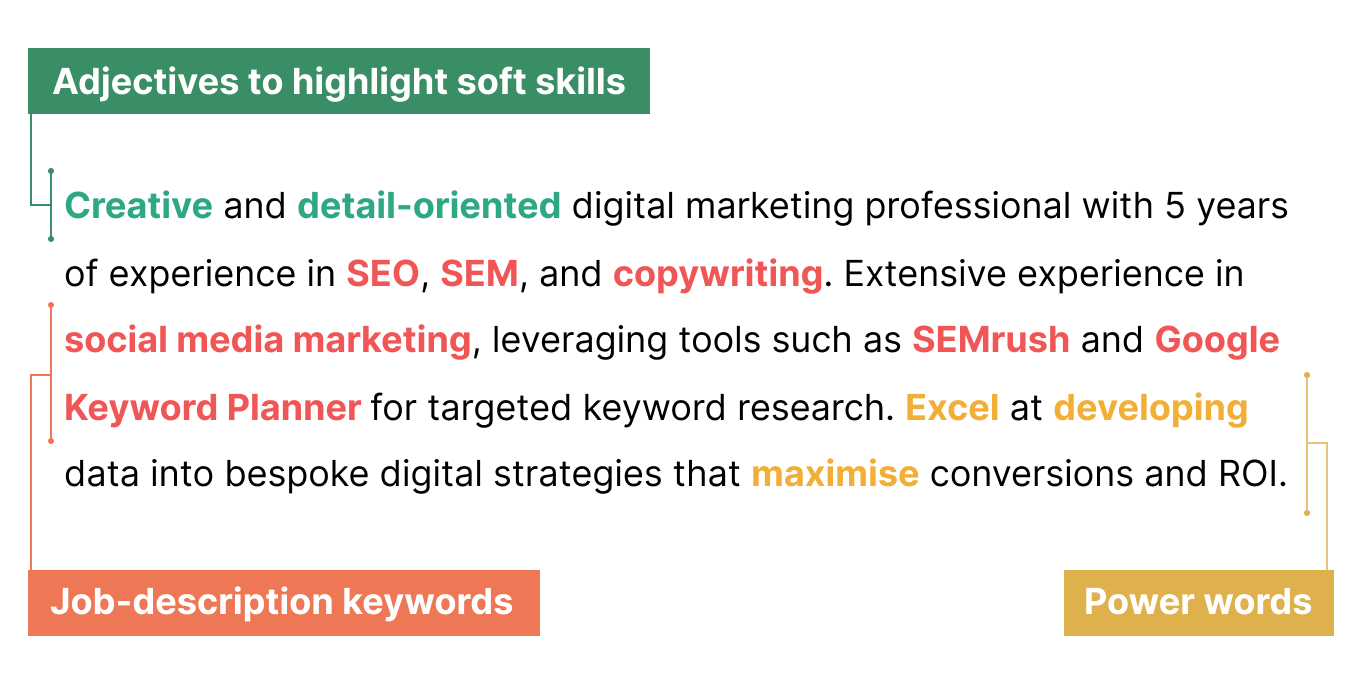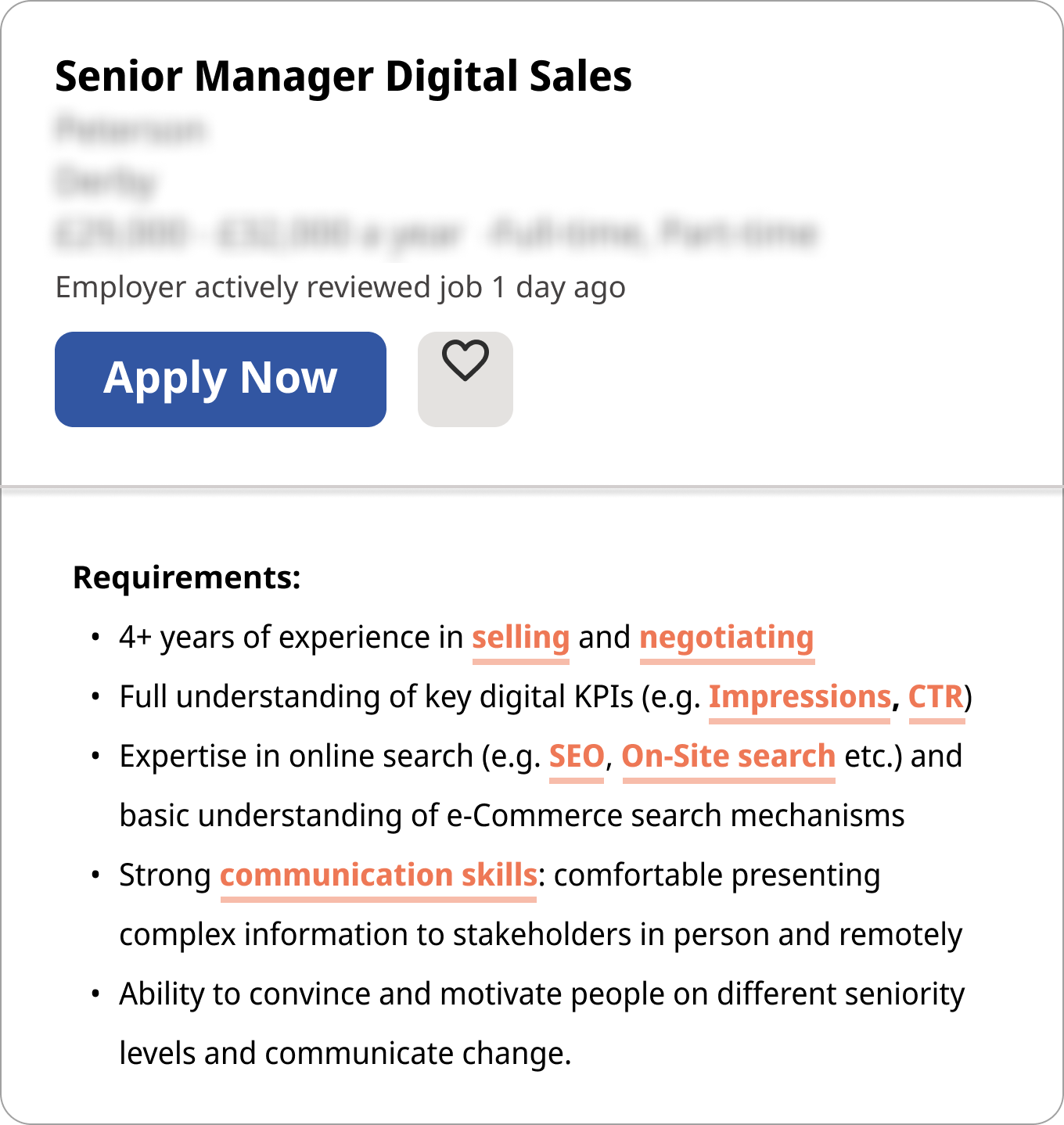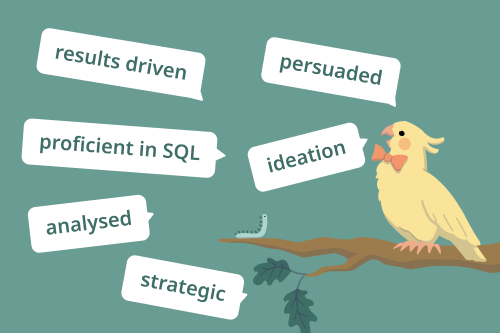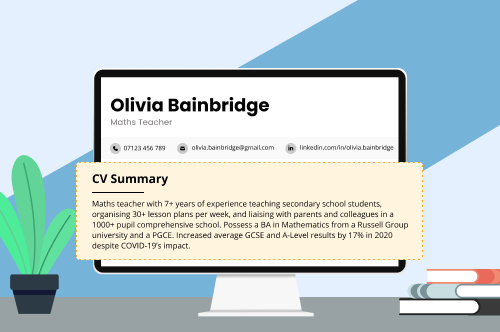What’s in a word?
A lot actually — especially when it comes to writing a job application.
Choosing the right words to use in a CV is about more than just choosing the right buzzwords for the job.
When you pepper your writing with highly relevant adjectives, keywords, and action verbs, you make it easy for the employer to spot your relevant qualifications and determine whether you’re right for the job.
So to help you write a fantastic CV that maximises your chance of success, we’ll walk you through the CV words you’ll need on your application — and explain how to use them to capture the employer’s interest.
What are the best words to use on a CV?
In any job-hunting situation, you should use a combination of the following keywords on your CV:
- adjectives that highlight your soft skills and work ethic
- job-description keywords that demonstrate your industry expertise
- power words that give context to your previous roles and achievements
Here’s a personal statement that illustrates what good CV words look like on the page:

1. CV adjectives for highlighting soft skills
Using the right adjectives in your CV, particularly in your about me section, helps convince the employer you have the right soft skills to excel at your job and fit in well with their team.
Which words are best for your application will depend on the job’s requirements. Here are a few examples of powerful adjectives to put on your CV, sorted by the soft skills they represent:
2. Job-description keywords
Industry-specific keywords show the employer you understand the role and have the right hard skills to handle its responsibilities.
For example, ‘WordPress’ and ‘content management systems (CMS)’ are popular keywords in the Content Marketing and Communications industries.
Including the right keywords is essential for ATS-optimising your CV so it passes the software most employers use to screen job applicants.
Here’s what keywords look like in a job description:

Pepper industry-specific keywords throughout your CV where appropriate (and accurate).
Essential keywords (e.g., ‘selling’, ‘negotiation’, ‘impressions’, and ‘CTR’ should appear in your personal statement, as the employer will read it first.
Job-description keywords vary considerably depending on the job. Here are a few examples of popular keywords employers use in different industries:
3. Power words for your work experience section
Power words (or action verbs) are ‘doing words’ used to describe your accomplishments and experiences. They replace generic phrases like ‘responsible for’ or ‘in charge of’ and make your CV more engaging.
Here are a few examples of power words you might include on a CV for a retail role:
How to use CV words to describe yourself and your achievements
While your CV word choice is important, employers will expect to see more than just a few choice keywords.
You still need to convince the employer that you have the skills and traits they’re looking for by demonstrating them clearly on your CV.
Here are three tips to help you prove you’re the talent the employer has been waiting for.
Tip 1. Find out what the employer wants to see
You’ll write a much more persuasive CV if you understand what the employer is looking for in your job application.
Begin by reading the job description closely to understand what skills and attributes the employer is looking for. These qualities will be your job-description keywords.
Next, consider how the role is described.
Perhaps they’re looking for someone to mentor, train, or supervise more junior workers or are they looking for a candidate who can assist customers and resolve their problems?
Think about the verbs and adjectives that are being used to describe the role and incorporate them into your CV sections.
Tip 2. Back up skills-related words with specific examples
Teamwork, communication, problem solving — they’re all valuable qualities that employees want. Unfortunately, they’re also meaningless on a CV if you don’t give them context.
When using a word that demonstrates a valuable skill, be sure to explain what you mean. See how these personal statement sentences clarify what the bolded words mean:
Supportive university administrator who fosters a positive work environment and provides guidance and onboarding assistance to staff.
Excel at crafting concise and compelling emails that increased outreach response rates by 25%.
Tip 3. Avoid clichés
Clichés like ‘team player’ or ‘multi-tasker’ weaken your CV because they’re tedious and vague, especially if you haven’t backed them up with specific examples.
Depending on the job’s industry and the level of seniority, a clichéd CV will make you appear anything from boring to unqualified.
The worst CV buzzwords sound poetic or exciting, but on closer inspection, say nothing about what you can do. It’s rarely a good idea to have one of these words on your CV:
Buzzwords and clichés to avoid
- Self-starter
- Dynamic
- Out-of-the-box thinker
- Trailblazer
- Visionary
- Problem solver
- Ninja
- Wizard
- All-star
- Legendary
- Epic
- Awesome
If you’re unsure if a word is clichéd, put it into a simple sentence and ask yourself what it tells a potential employer.
‘I have strong leadership skills’ highlights a valuable soft skill (when backed up with a good example).
‘I’m a trailblazer’ does not.
Most CV words you use to describe yourself will appear clichéd if you don’t show the employer why they’re accurate. Include specific examples and hard numbers to make your CV descriptive and compelling.
Frequently asked questions about CV words
Still unsure of how to word your CV effectively? Here are the answers to three common CV wording questions to help you write an attention-grabbing job application:
1. What are CV keywords?
On a CV, keywords are specific words or phrases that employers look for to check whether the applicant is qualified for the job.
Keywords are often words, phrases, or metrics that represent specific skills or core traits. For example, ‘resolved’, ‘first response time’, and ‘customer relationship management (CRM) software’ are all valuable keywords to put on a customer service CV.
2. What are the best active words for a CV?
The best active words for your CV should give context to your achievements by telling the employer a bit about how you did various tasks. Here are some good active words for a CV:
- Achieved
- Implemented
- Led
- Developed
- Managed
- Spearheaded
- Established
- Collaborated
- Analysed
- Enhanced
3. What should I say on my CV?
If you’re writing your first CV, highlight relevant achievements from independent projects, volunteer roles, and school or uni work.
Focus on achievements relevant to the job’s core responsibilities, and try to add keywords from the job description to relate your accomplishments to the employer’s needs.
More common CV questions
Still have doubts about how to make a CV? Here are three more common CV queries to help you get going:




